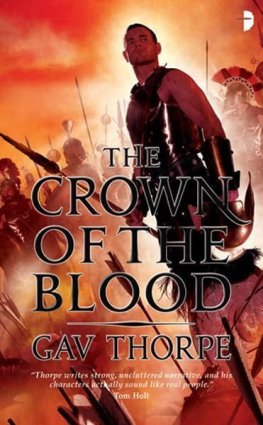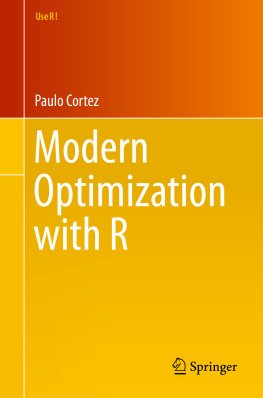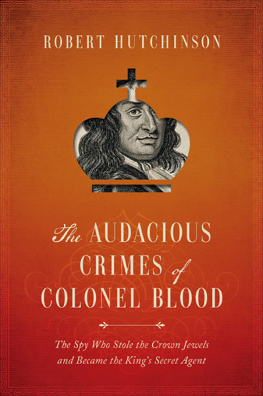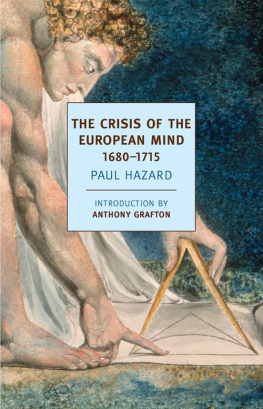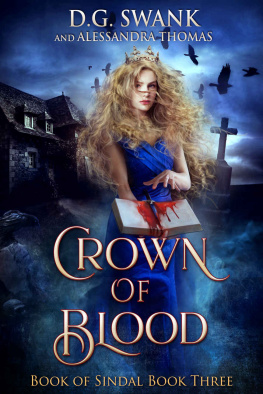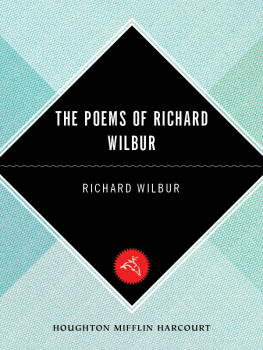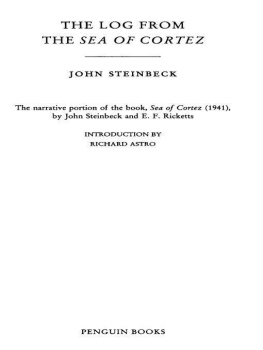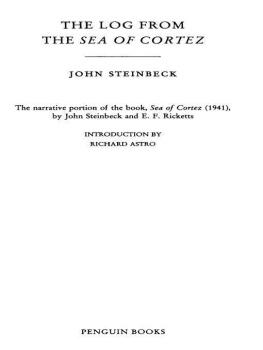Colonel Thomas Blood
The story which follows is, without doubt, one of the most curious and extraordinary in English history. It is, in fact, so remarkable that it seems necessary to begin by assuring the cautious reader that it is true. Much as it may resemble at times that species of literature known in England as the shilling shocker and in America as the dime novel, its material is drawn, not from the perfervid imagination of the author, but from sources whose very nature would seem to repudiate romance. The dullest and most sedate of official publications, Parliamentary reports, memoranda of ministers, warrants to and from officers and gaolers, newsletters full of gossip which for two hundred years and more has ceased to be news, these would seem to offer little promise of human interest.
Yet even these cannot well disguise the fascination of a life like that of Thomas Blood. The tale of adventure has always divided honours with the love story. And such a career as his, full of mystery, of personal daring, and the successful defiance of law by one on whom its provisions seem to have borne too hardly, cannot be obscured even by the digest of official documents. Moreover it has historical significance. This most famous and successful of English lawbreakers was no common criminal. In a sense he was the representative of an important class during a critical period of history. Not merely to the Old Englander, but to those interested in the rise of the New England beyond seas, the fate of the irreconcilable Puritans, no less than that of their more submissive brethren, must seem of importance. This is the more true in that no small number of the men whose names appear in this narrative played parts on both sides of the Atlantic. The younger Vane, who had been the governor of Massachusetts, in 1636, and whose execution marked the early years of Restoration vengeance, is the most striking of these figures. Next to him come the fugitive regicides, Goffe, Whalley and Dixwell, who lived out their days in New Haven, Hartford and Hadley. It is not so well known, however, that Venner, whose insurrection in the early days of the Restoration was one of the most dramatic and important events of that time, was at one time a resident of Salem. Still less is it likely to be known that Paul Hobson, one of the contrivers and the involuntary betrayer of the great plot of 1663, was later allowed to remove to Carolina. The relationship of Lawrence Washington, whose activities in the early years of Charles II's reign gave the government such anxiety, to the Washingtons who settled in Virginia has been vigorously denied. But certainly no small element among these irreconcilables found sympathy, support or refuge among their brethren in the New World. And it was perhaps no more than chance that the subject of this sketch did not become governor of an English colony in America.
This essay began as a serious historical study, whose larger results are chronicled in another place. But it grew insensibly into the only form of composition which seemed to do it any sort of justice, a species of story. It is, in short, a romance, which differs from its kind chiefly in that it has a larger proportion of truth. On the other hand it lacks in equal measure what is generally superabundant in such works, a plot. It has a plot, indeed many plots, but it is not always easy to determine just what the plot is or what relation the hero or villain as you like, bears to it. It has, above all, a mystery which may atone for its shortcomings in other directions. And it has, finally, for its central figure a character whose strange, surprising adventures were the marvel of his day and are not greatly dimmed by the dust of two centuries. On these grounds it seems not unprofitable nor uninteresting to contemplate again and in a new light the life and works of the man who has been generally conceded the bad eminence of being the most daring and successful of English rascals, Thomas Blood, courtesy-colonel of conspiracy and crown-stealer. The scene of his activity was that brilliant and obscure period we know as the Restoration, those years during which his most gracious Majesty, King Charles the Second, of far from blessed memory, presided over the destinies of the English race. And you are, if you wish, to transport yourself at once into the very midst of the reign of him who for his wit and wickedness has been forever miscalled the Merry Monarch.
The great event of the winter of 1670-1 in English politics and society was a circumstance unprecedented in European affairs, the visit of the head of the House of Orange to the English Court. The young Prince William, soon to become the ruler of Holland, and later King of England, made this, his first visit to the nation which one day he was to rule, ostensibly to pay his respects to his uncle Charles who was then King, and his uncle James, who was Duke of York. Beside this his journey was officially declared to have no other purpose than pleasure and the transaction of some private business. What affairs of state were then secretly discussed by this precocious statesman of nineteen and His British Majesty's ministers of the Cabal, we have no need to inquire here, nor would our inquiries produce much result were they made. The web of political intrigue then first set on the roaring loom of time which was to plunge all England into agitation and revolution and unrest, and all western Europe into war, has, for the moment, little to do with this story. There was enough in the external aspects of his visit to fill public attention then and to serve our purpose now. The five months of his stay were one long round of gayety. Balls, receptions, and dinners, horse-races, cocking mains, gaming and drinking bouts followed each other in royal profusion. And a marriage already projected between the Prince and his cousin, the Princess Mary, gave a touch of romance to the affair, only qualified by the fact that she still played at dolls in the nursery.
The court was not alone in its efforts to entertain the young prince. The ministers, the leaders of the opposition, and many private individuals beside, lent their energies to this laudable end. The work was taken up by certain public or semi-public bodies. And, in particular, the corporation of the great city of London felt that among these festivities it must not be outdone in paying some attention to the most distinguished citizen of the neighbouring republic, who, as it happened, was also the most promising Protestant candidate for the English throne. Accordingly on the afternoon of Tuesday, December 6, 1670, as the custom then was, they tendered him a banquet at Guildhall where were assembled the wealth and beauty of the city to do him honour. The great function, apart from a subtle political significance which might have been noted by a careful and well-informed observer, was not unlike others of that long series of splendid hospitalities by which the greatest city in the world has been accustomed for centuries to welcome its distinguished guests. There was the same splendour of civic display, the same wealth of courses, the same excellent old wine, doubtless the same excellent old speeches. And in spite of the greatness of the event and the position and importance of the guest of honour, the glories of this noble feast, like those of so many of its fellows, might well have passed into that oblivion which enfolds dead dinner parties had it not been that before the evening was over it had become the occasion of one of the most daring and sensational adventures in the annals of crime, the famous attempt on the Duke of Ormond.



